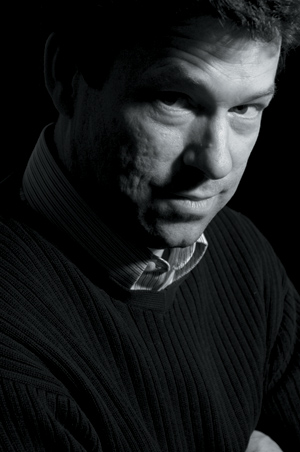|
||
      |
Features ::
Glimpses
 James
Graff, AB’81, was a stringer for Time magazine as an undergrad,
but he got most of his bylines in two South Side start-ups, the Chicago
Journal and the left-wing Haymarket. After working for the University
of Chicago Magazine, he was off to graduate school in Munich. There
he studied history—and was a stringer for the Atlanta Journal-Constitution.
In 1987 he again “hooked up with Time” as a contract
correspondent, then went full time as Time’s Canada correspondent
in Ottawa, where he met his wife Frances; son Austin was born in 1993.
Sent to Vienna in 1991 (reporting the war in Yugoslavia, he spent a week
in the Muslim enclave of Gorazde), he moved to Chicago four years later
(“In principle we covered everything from West Virginia to North
Dakota”). He was named Paris bureau chief in January 1998. This January,
as Time Warner’s planned cutbacks made his bureau’s future
uncertain, Graff discussed the correspondent’s role: “It’s
a question of being away from the center. It’s talking to someone
whose experience is vastly different from your own and somehow mediating
that experience to other people.”
James
Graff, AB’81, was a stringer for Time magazine as an undergrad,
but he got most of his bylines in two South Side start-ups, the Chicago
Journal and the left-wing Haymarket. After working for the University
of Chicago Magazine, he was off to graduate school in Munich. There
he studied history—and was a stringer for the Atlanta Journal-Constitution.
In 1987 he again “hooked up with Time” as a contract
correspondent, then went full time as Time’s Canada correspondent
in Ottawa, where he met his wife Frances; son Austin was born in 1993.
Sent to Vienna in 1991 (reporting the war in Yugoslavia, he spent a week
in the Muslim enclave of Gorazde), he moved to Chicago four years later
(“In principle we covered everything from West Virginia to North
Dakota”). He was named Paris bureau chief in January 1998. This January,
as Time Warner’s planned cutbacks made his bureau’s future
uncertain, Graff discussed the correspondent’s role: “It’s
a question of being away from the center. It’s talking to someone
whose experience is vastly different from your own and somehow mediating
that experience to other people.”
A tale of two presidential races: The French election is American in a sense now, this year more than ever, because it’s very personality driven. We’ve had an actual primary to determine the Socialist Party candidate—and Ségolène Royal won. She bypassed the party nomenclature and got to the voters. That’s a real American thing. The conservative candidate, Nicolas Sarkozy, likewise is someone who has been a bit of a rebel from Chirac—he’s talking about rupture, he wants to change things. Of course, the calendar is much more truncated. Royal was chosen in November, and Sarkozy was officially chosen in January. The election happens in April.
Whose France is it anyway? There is not a single black
or Muslim member of the national assembly, which is appalling, given that
10 percent of the population is Muslim. If you go out to the cités—the
housing projects—you’ve got communities that are probably 80
percent immigrant origin. None has a black or Muslim mayor. It’s
a real problem, and I think it’s going to be resolved, to some degree,
in the April elections. The Socialist Party is putting up several Maghreb
[immigrants from north or northwest Africa] candidates, but they’re
putting them up in the countryside. The idea is that you ought to have
a diverse Assemblée nationale, but the black guy should
not necessarily represent a black community. It’s a noble idea, but
it flies in the face of the facts.
State of the state: Paris is a combination of LA, New York,
and Washington—the elite of every sector is in Paris, and yet Paris is
shrinking. The regions don’t have enough of a voice. France has a problem
fitting its constituent parts into France, and it has a problem fitting itself
into Europe. The French state is supposed to encompass everything, but it fails
to encompass the aspirations of its people for something smaller than France—for
the region of Picardie, say. In the same way, France thought that it could
put on Europe as a set of armor and march out into the world bigger than it
was, but everybody’s vision of what Europe ought to be is not the French
vision.
Journalism’s next big thing: Asia is massive and growing—the story of the 21st century is probably going to be the rise of China. It’s not going to be the rebirth of Europe. Europe’s appeal—which remains strong, we still want to read about Europe—is watching as its peoples figure out how to preserve their traditions without becoming petrified and turning into museums. How do you combine the vigor that will allow you to persist in a world driven by globalization and economics with other things you cherish?
Do newsmagazines have a future? Everybody is suffering to some degree from trying to figure out what the role of newsmagazines should be in an era when most people get their news from Web sites or the radio or television. People still need stories. That’s the hard part. Things are complex, and trying to make stories out of them is going to be a challenge for all of us. You have to dig—not just dig in the sense of Seymour Hersh [AB’58] digging—you have to figure out the bigger trends behind the things that are changing.
Next challenge: I’ve never taken or given a journalism class in my life, but I’m going to teach a course in political journalism at Sciences Po [the Institut d’Etudes Politiques de Paris] this quarter. Luckily it doesn’t start ’til March 1.